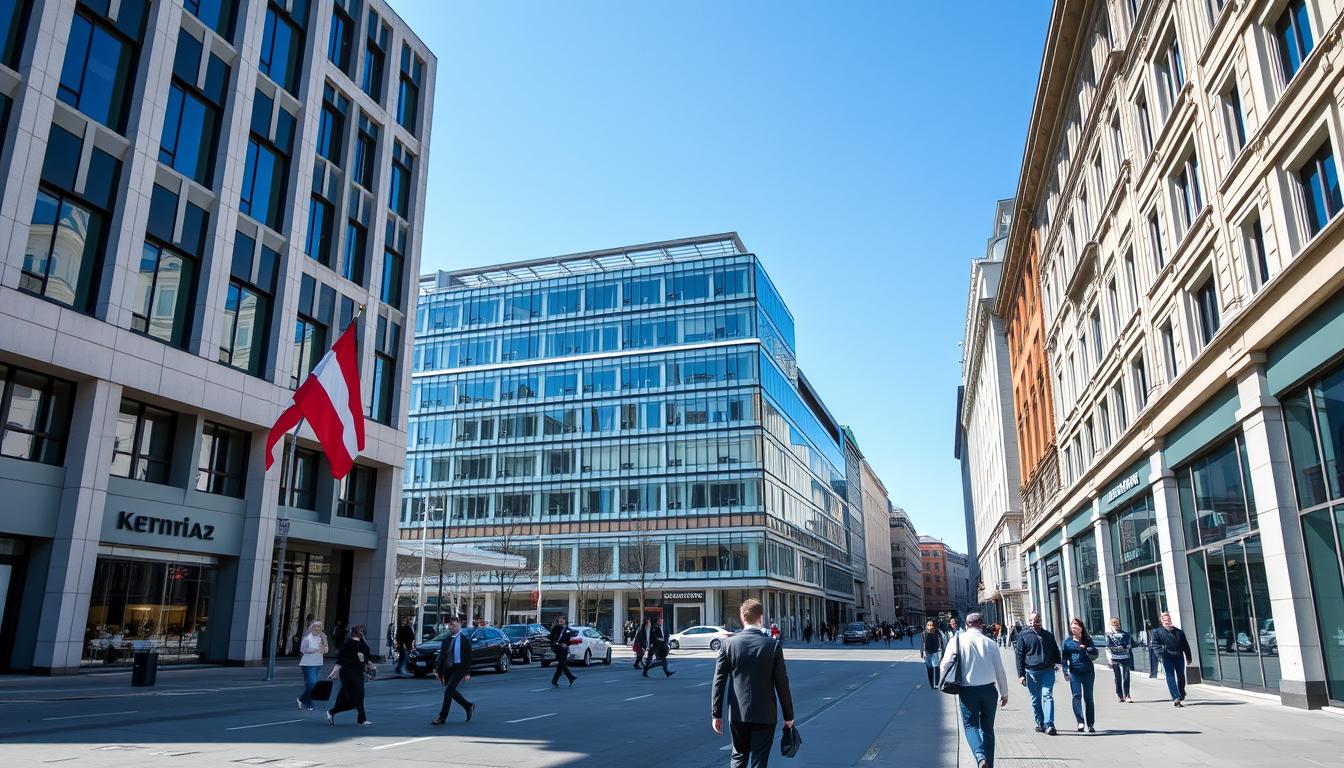Austria offers a welcoming environment for foreign entrepreneurs with its stable economy, central European location, and high quality of life. For foreigners looking to establish a business in Austria, understanding the local market, regulatory requirements, and promising sectors is essential for success. This comprehensive guide explores the top 10 small business ideas in Austria specifically suited for foreigners, complete with startup costs, revenue potential, and practical insights to help you make informed decisions.
Need Personalized Business Advice?
Get expert guidance on starting your business venture in Austria. Our consultants specialize in helping foreigners navigate the Austrian business landscape.
Austria’s Business Climate for Foreigners
Before diving into specific business ideas, it’s important to understand what makes Austria an attractive destination for foreign entrepreneurs. The country ranks high in ease of doing business, with a streamlined company registration process that typically takes 1-2 weeks. Austria’s strategic location at the heart of Europe provides access to both Western and Eastern European markets, while its stable political and economic environment minimizes business risks.
Vienna’s business district represents Austria’s thriving economic environment
Foreign entrepreneurs can own 100% of their business in most sectors, though certain regulated industries may have restrictions. Knowledge of German is beneficial but not always mandatory, especially in tourism and international business sectors where English is widely spoken. The country also offers various incentives for startups and small businesses, including grants and tax benefits.
Comparison of Top 10 Small Business Ideas in Austria for Foreigners
This comprehensive comparison table highlights key metrics for the most viable business opportunities in Austria for foreign entrepreneurs. Each business idea is evaluated based on startup costs, potential revenue, ease of setup, and target audience to help you identify the most suitable option for your skills and investment capacity.
| Business Idea | Startup Cost Range (EUR) | Avg. Monthly Revenue (EUR) | Ease of Setup (1-5) | Target Audience | More Info |
| E-commerce Store | €5k-€20k | €3k-€10k | 4/5 | Global/Local Consumers | Contact Us |
| Tourism & Travel Services | €15k-€40k | €5k-€15k | 3/5 | International Tourists | Contact Us |
| Food Truck/Café | €20k-€50k | €4k-€12k | 3/5 | Locals & Tourists | Contact Us |
| Language School | €10k-€30k | €3k-€8k | 4/5 | Expats & Locals | Contact Us |
| Digital Marketing Agency | €5k-€15k | €4k-€15k | 4/5 | Local Businesses | Contact Us |
| Eco-Friendly Products | €10k-€25k | €3k-€9k | 3/5 | Eco-Conscious Consumers | Contact Us |
| Wellness & Spa Center | €50k-€150k | €8k-€20k | 2/5 | Locals & Tourists | Contact Us |
| IT Consulting | €5k-€15k | €5k-€15k | 4/5 | SMEs & Startups | Contact Us |
| Artisanal Crafts Shop | €15k-€35k | €3k-€8k | 3/5 | Tourists & Locals | Contact Us |
| Co-working Space | €30k-€80k | €5k-€15k | 2/5 | Freelancers & Remote Workers | Contact Us |
1. E-commerce Store
E-commerce represents one of the most accessible business ideas for foreigners in Austria, with lower entry barriers and the ability to reach both local and international markets. Austria’s high internet penetration rate (89%) and growing preference for online shopping make this an attractive option.

E-commerce offers flexibility and scalability for foreign entrepreneurs in Austria
Features
- Requires business registration and VAT number (UID) for operations
- Can be operated remotely or with minimal physical presence
- Needs compliance with EU e-commerce regulations and GDPR
- Benefits from Austria’s excellent logistics infrastructure
- Can target both Austrian and EU markets
Pros
- Lower initial investment compared to brick-and-mortar
- Flexible working hours and location independence
- Access to Austria’s high-income consumer base
- Easier to scale across EU markets
- Fewer language barriers for international entrepreneurs
Cons
- High competition in popular niches
- Need to understand EU consumer protection laws
- Requires digital marketing expertise
- Seasonal fluctuations in certain product categories
- Customer service may require German language skills
For foreigners looking to enter the Austrian market, focusing on niche products or underserved market segments can be particularly effective. Consider specializing in products that leverage your international connections or cultural background, creating a unique selling proposition in the Austrian market.
2. Tourism & Travel Services
Austria’s tourism industry is robust, attracting over 30 million visitors annually. For foreigners with knowledge of both Austrian culture and the needs of international travelers, tourism services offer significant opportunities. This sector is particularly suitable for those who can bridge cultural gaps and provide unique experiences.

Tourism services cater to Austria’s 30+ million annual visitors
Features
- Requires tourism business license (Gewerbeanmeldung)
- May need specific certifications for certain activities (hiking, skiing)
- Seasonal variations with peaks in summer and winter
- Benefits from multilingual capabilities
- Can focus on niche markets (culinary tours, historical tours, etc.)
Foreign entrepreneurs can leverage their unique perspectives to create specialized tourism experiences that domestic operators might not offer. Consider focusing on connecting tourists from your home country to authentic Austrian experiences, or creating fusion cultural experiences that bridge multiple traditions.
Start Your Tourism Business in Austria
Get expert guidance on tourism licenses, regulations, and market opportunities specific to foreign entrepreneurs.
3. Food Truck or Café Business
Austria’s food scene welcomes international influences, making it an excellent opportunity for foreigners to introduce unique culinary concepts. Whether through a mobile food truck or a small café, bringing authentic international cuisine or fusion concepts can attract both locals and tourists seeking new flavors.

Food trucks offer lower entry costs than traditional restaurants
Features
- Requires food handling licenses and health permits
- Food trucks need permits for specific locations
- Must comply with Austrian food safety regulations
- Benefits from location in tourist areas or business districts
- Requires knowledge of local taste preferences
Specifications
| Requirement | Details |
| Business Registration | Trade license (Gewerbeanmeldung) specific to food service |
| Health Certificates | Food handling certification for all staff |
| Location Permits | For food trucks: permits for specific locations from local municipality |
| Tax Obligations | VAT registration, income tax, employee taxes if applicable |
| Insurance | Liability insurance, property insurance |
For foreigners, highlighting authentic cuisine from your home country can create a unique selling proposition in the Austrian market. Consider starting with a food truck to test concepts before investing in a permanent location, and leverage social media marketing to build a following among both locals and expatriate communities.
4. Language School or Translation Services
Austria’s position as an international business hub and tourist destination creates consistent demand for language services. Foreigners with strong language skills can establish language schools, offer translation services, or provide specialized language training for business professionals.

Language schools serve both locals and the expatriate community
Features
- Can operate online, in-person, or hybrid models
- May require teaching certifications for formal language schools
- Benefits from location near business districts or universities
- Can offer specialized business language training
- Translation services can be operated remotely
“The demand for English language training in Austria grows approximately 5% annually, with business English and specialized technical language training seeing the highest growth rates.”
Foreign entrepreneurs have a natural advantage in this sector, especially when teaching their native language. Consider focusing on niche areas such as business language training, exam preparation, or specialized technical translation services to differentiate from larger language schools.
Explore Language Business Opportunities
Get our comprehensive guide on establishing language schools or translation services in Austria as a foreigner.
5. Digital Marketing Agency
Austrian businesses increasingly seek digital marketing expertise to expand their online presence, creating opportunities for foreigners with digital skills. A digital marketing agency can serve local businesses looking to improve their online visibility while leveraging international experience and perspectives.

Digital marketing agencies help Austrian businesses expand their online presence
Features
- Low startup costs compared to physical businesses
- Can be operated with a small team or as a solo entrepreneur
- Benefits from international experience and multilingual capabilities
- Requires understanding of local market preferences
- Can specialize in specific industries or marketing channels
Pros
- Low initial investment requirements
- Location flexibility and remote work possibilities
- Growing demand from Austrian businesses
- Ability to leverage international experience
- Scalable business model
Cons
- Competitive market with established agencies
- May require German language skills for local clients
- Need to stay current with rapidly changing digital trends
- Building initial client base can be challenging
- Requires portfolio of successful campaigns
Foreign entrepreneurs can position themselves as specialists in helping Austrian businesses reach international markets or target specific foreign demographics. Consider focusing on a niche industry or specific digital marketing channel to differentiate your services in a competitive market.
6. Eco-Friendly Products Business
Austria’s strong environmental consciousness makes it an ideal market for eco-friendly products and services. With one of Europe’s highest recycling rates and strong consumer preference for sustainable options, businesses focusing on green products have significant growth potential.

Sustainable products align with Austrian consumers’ environmental values
Features
- Can include retail, manufacturing, or service-based models
- Benefits from Austria’s strong environmental regulations
- May qualify for green business incentives and grants
- Requires authentic commitment to sustainability
- Can target both B2C and B2B markets
Market Opportunities
| Product Category | Market Growth | Competition Level | Profit Margin |
| Biodegradable Packaging | 15% annually | Medium | 30-40% |
| Sustainable Fashion | 12% annually | High | 35-50% |
| Zero-Waste Products | 18% annually | Medium-Low | 40-60% |
| Organic Cosmetics | 10% annually | High | 45-65% |
Foreign entrepreneurs can introduce innovative eco-friendly products from their home countries that aren’t yet available in Austria. Consider focusing on products with strong sustainability credentials and transparent supply chains, as Austrian consumers are well-informed about environmental issues.
Launch Your Eco-Business in Austria
Discover opportunities in Austria’s growing sustainable products market with our comprehensive guide.
7. Wellness and Spa Center
Austria has a strong wellness culture, with spa visits and health treatments being an integral part of the lifestyle. Foreign entrepreneurs can introduce international wellness concepts, traditional treatments from their home countries, or fusion approaches that combine multiple traditions.

Wellness centers cater to health-conscious Austrians and tourists
Features
- Requires specific health and safety certifications
- Staff may need professional qualifications
- Benefits from location in tourist areas or affluent neighborhoods
- Can incorporate unique international wellness traditions
- May require significant initial investment
Foreign entrepreneurs can differentiate by introducing authentic wellness traditions from their home countries or creating fusion concepts that combine multiple cultural approaches. Consider starting with a smaller specialized studio before expanding to a full wellness center to reduce initial investment requirements.
8. IT Consulting and Software Development
Austria’s growing tech sector and digital transformation initiatives create demand for IT expertise. Foreign entrepreneurs with technical skills can establish consulting firms or software development companies serving Austrian businesses and potentially clients throughout the EU.

IT consulting helps Austrian businesses with digital transformation
Features
- Low physical infrastructure requirements
- Can operate remotely or with minimal office space
- Benefits from Austria’s strong internet infrastructure
- May qualify for tech startup incentives
- Can serve clients throughout the EU
Key Insight: Austria’s IT sector is growing at 5.3% annually, with particularly strong demand for cybersecurity, cloud solutions, and digital transformation consulting. Foreign entrepreneurs with specialized technical expertise can find significant opportunities in underserved niches.
Foreign IT professionals can leverage their international experience and potentially lower cost structures compared to established Austrian firms. Consider focusing on specific industries or technologies where you have specialized expertise, and build relationships with local business networks to establish credibility in the market.
Start Your IT Business in Austria
Get our comprehensive guide on establishing an IT consulting or software development business as a foreigner in Austria.
9. Artisanal Crafts and Specialty Products
Austria values craftsmanship and unique products, creating opportunities for artisanal businesses. Foreign entrepreneurs can introduce traditional crafts or specialty products from their home countries, appealing to both tourists seeking authentic souvenirs and locals interested in international items.

Artisanal products appeal to both tourists and local consumers
Features
- Can operate as physical store, online shop, or market stall
- Benefits from location in tourist areas or cultural districts
- May qualify for cultural business grants
- Can combine production and retail
- Benefits from storytelling and cultural authenticity
Pros
- Lower competition than mass-market products
- Higher profit margins on handcrafted items
- Ability to leverage cultural background
- Appeals to tourism market
- Can start small and scale gradually
Cons
- Seasonal fluctuations in tourist areas
- Supply chain challenges for imported materials
- Labor-intensive production processes
- May require specialized skills
- Limited scalability for handmade items
Foreign entrepreneurs have a natural advantage in this sector by introducing authentic crafts and products from their home countries. Consider creating a compelling story around your products that highlights their cultural significance and authenticity to differentiate from mass-produced alternatives.
10. Co-working Space Business
Austria’s growing startup ecosystem and remote work trends create demand for flexible workspace solutions. Foreign entrepreneurs can establish co-working spaces that cater to international professionals, digital nomads, and local entrepreneurs seeking community and networking opportunities.

Co-working spaces serve Austria’s growing remote work community
Features
- Requires suitable commercial property
- Needs high-speed internet and office infrastructure
- Benefits from location near business districts or universities
- Can offer additional services (events, workshops, etc.)
- May require significant initial investment
Specifications
| Requirement | Details |
| Business Registration | Standard business registration (Gewerbeanmeldung) |
| Property | Commercial lease with appropriate zoning |
| Insurance | Liability, property, and business interruption insurance |
| Internet | High-speed fiber connection with redundancy |
| Safety | Compliance with workplace safety regulations |
Foreign entrepreneurs can create co-working spaces that specifically cater to international professionals or digital nomads, offering multilingual support and services that help newcomers navigate life in Austria. Consider partnering with other business service providers to create a comprehensive support ecosystem for your members.
Launch Your Co-working Business
Get our detailed guide on establishing and operating a successful co-working space in Austria.
Legal and Regulatory Considerations for Foreign Entrepreneurs
Understanding Austria’s legal framework is essential for foreign entrepreneurs. This section outlines key regulatory considerations to help you navigate the process of establishing your business in Austria.

Understanding legal requirements is crucial for business success
Key Legal Requirements
- Business registration (Gewerbeanmeldung) with the local trade authority
- Registration with the tax office for income tax and VAT
- Social security registration if employing staff
- Residence permit for non-EU citizens (typically requires business plan)
- Industry-specific licenses for regulated sectors
Important: Non-EU citizens typically need to obtain a residence permit that allows self-employment or entrepreneurial activities. This usually requires demonstrating that the business will benefit the Austrian economy through investment, job creation, or innovation.
Foreign entrepreneurs should consider working with local legal advisors who specialize in business formation for non-citizens. The initial investment in proper legal guidance can prevent costly mistakes and ensure compliance with all relevant regulations.
Conclusion: Top Business Opportunities for Foreigners in Austria
Austria offers a welcoming environment for foreign entrepreneurs with its stable economy, central European location, and high quality of life. Based on our analysis of startup costs, revenue potential, and ease of setup, the following business ideas stand out as particularly promising for foreigners:
E-commerce
With low startup costs, minimal language barriers, and the ability to reach both local and EU markets, e-commerce represents an accessible entry point for foreign entrepreneurs in Austria.
Tourism Services
Leveraging Austria’s robust tourism industry and your unique international perspective creates opportunities for specialized travel experiences that domestic operators might not offer.
Digital Marketing
The growing demand for digital expertise combined with low startup requirements makes digital marketing services an attractive option for skilled foreign entrepreneurs.
Regardless of which business idea you pursue, success in Austria requires understanding local market preferences, complying with regulatory requirements, and potentially adapting your business model to suit Austrian consumer expectations. With proper planning and research, foreign entrepreneurs can find numerous opportunities in this stable and prosperous European market.
Ready to Start Your Austrian Business Journey?
Get personalized guidance on the best business opportunity for your skills, experience, and investment capacity.
Frequently Asked Questions
Can foreigners own 100% of a business in Austria?
Yes, foreigners can own 100% of a business in Austria in most sectors. There are no general restrictions on foreign ownership, though certain regulated industries like banking, insurance, and some utility services may have specific requirements. Non-EU citizens will need appropriate residence permits that allow entrepreneurial activities.
What business structure is best for small businesses in Austria?
For small businesses, the most common structures are:
- Sole Proprietorship (Einzelunternehmen): Simplest form with minimal startup requirements but unlimited personal liability.
- Limited Liability Company (GmbH): Provides liability protection but requires €35,000 minimum capital (though only €17,500 must be paid initially).
- Small LLC (GmbH “light”): A modified GmbH with reduced minimum capital requirements of €10,000 (with €5,000 paid initially).
The best choice depends on your specific circumstances, risk tolerance, and growth plans.
Do I need to speak German to start a business in Austria?
While not strictly required by law, practical knowledge of German is highly beneficial for running a business in Austria. Official documentation, tax forms, and regulatory communications are typically in German. However, in sectors like tourism, IT, and international business, English is widely spoken. Many foreign entrepreneurs partner with German-speaking locals or hire staff with language skills to overcome this barrier.
What are the tax implications for foreign business owners in Austria?
Foreign business owners in Austria are subject to:
- Corporate Income Tax: 25% flat rate for corporations
- Personal Income Tax: Progressive rates from 0% to 55% for sole proprietors
- Value Added Tax (VAT): Standard rate of 20%, with reduced rates of 10% or 13% for certain goods and services
- Social Security Contributions: Required for self-employed individuals and employees
Austria has double taxation agreements with many countries to prevent income from being taxed twice. Consulting with a tax advisor familiar with international tax law is highly recommended.
What support is available for foreign entrepreneurs in Austria?
Austria offers various support mechanisms for foreign entrepreneurs:
- Austrian Business Agency (ABA): Provides free consulting services for foreign investors
- Austria Wirtschaftsservice (aws): Offers grants, loans, and guarantees for startups and SMEs
- Regional Business Agencies: Each federal state has its own business promotion agency
- Startup Incubators and Accelerators: Programs like Vienna Startup Package specifically target international entrepreneurs
- Networking Organizations: Groups like the Austrian Federal Economic Chamber help connect businesses
Many of these organizations offer services in English and specifically cater to the needs of foreign entrepreneurs.







